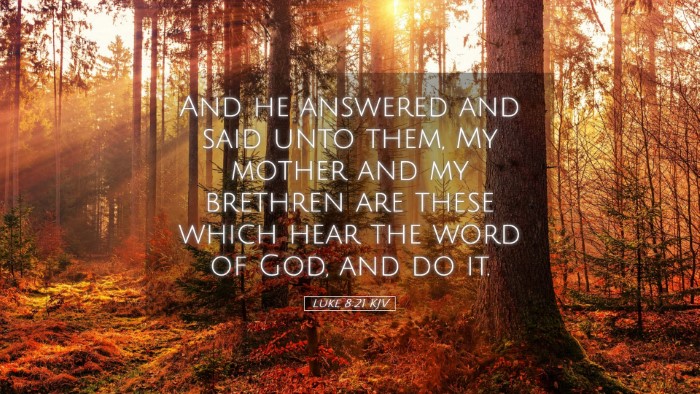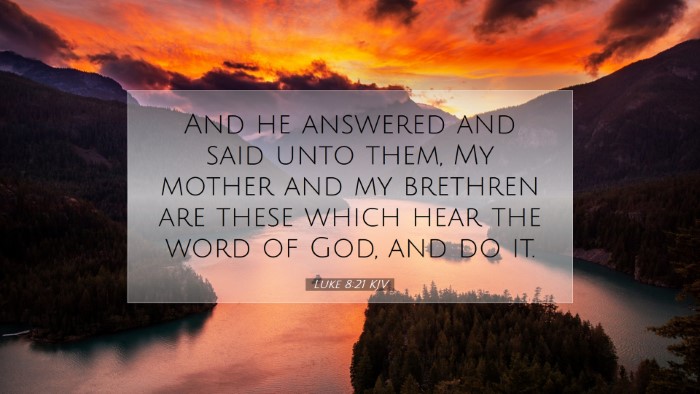Bible Commentary on Luke 8:21
Verse: Luke 8:21 - "But he answered and said unto them, My mother and my brethren are these which hear the word of God, and do it."
Introduction
In this passage, Jesus redefines familial relationships in terms of spiritual kinship rather than biological ties. This declaration offers profound theological implications about the nature of discipleship and the community of believers.
Both Matthew Henry and Albert Barnes offer valuable insights into understanding the context and significance of this statement.
Contextual Background
The setting of this verse comes at a time when Jesus was increasingly surrounded by crowds who were eager to hear His teachings and witness His miracles. His biological family is mentioned to be seeking Him, which raises questions about His family's understanding of His ministry and mission.
Adam Clarke emphasizes that Jesus’ response should be viewed not as a dismissal of His earthly family but as a demonstration of priority in spiritual matters over earthly bonds.
Interpretation of the Verse
Jesus’ response, “My mother and my brethren are these which hear the word of God, and do it,” reflects His teaching that true relationship with Him encompasses obedience to God's word. This reorientation from blood relations to spiritual community challenges the cultural norms of familial loyalty.
-
Matthew Henry interprets this as an invitation into a more profound relationship with Christ, where obedience and adherence to God's word shape our identity as His followers.
-
Albert Barnes underscores that Jesus is redefining family, emphasizing that spiritual ties are deeper than social or familial connections, portraying a stronger bond among believers who act upon God's word.
The Theology of Discipleship
The concept of discipleship is built into Jesus’ teaching and is underlined in this declaration. To be a disciple is fundamentally to hear the word of God and act upon it.
-
Adam Clarke points out that listening without action does not constitute true discipleship. This aligns with the broader biblical principle found in James 1:22, which exhorts believers to be doers of the word and not merely hearers.
-
Matthew Henry reflects on the responsibilities that come with discipleship, emphasizing that listening to God’s word obliges believers to live it out in their daily lives.
Practical Implications for Believers
This verse challenges Christians to examine their relationships and priorities. Are we merely identifying as Christians by association, or are we actively engaging with the teachings of Christ? Here are some implications for consideration:
- Prioritize Spiritual Family: Believers should seek to foster relationships with fellow Christians who encourage adherence to God’s word.
- Action-Oriented Faith: The call to action illustrates that faith must express itself through works, reinforcing the importance of living out the Gospel.
- Redefining Relationships: Discipleship might cause rifts in earthly relationships as spiritual commitments sometimes conflict with social expectations.
Conclusion
Luke 8:21 serves as a significant reminder of the nature of true kinship in the body of Christ. It invites all Christians, pastors, students, and scholars to consider their level of engagement with God’s word and its implications for their identity as His followers.
By discerning our relationships through the lens of discipleship, we participate in a community defined not by blood but by faith and action, thereby fulfilling Christ’s command to be His true family.


